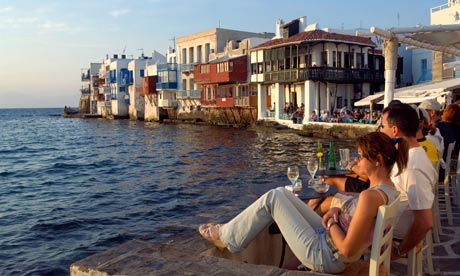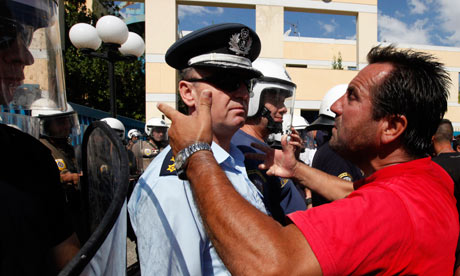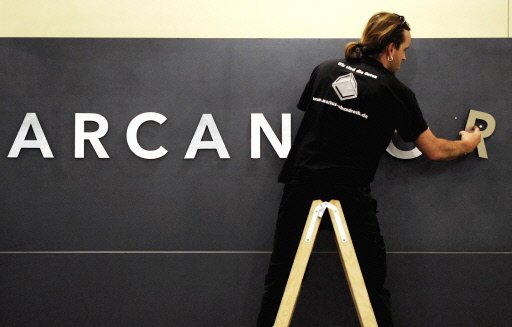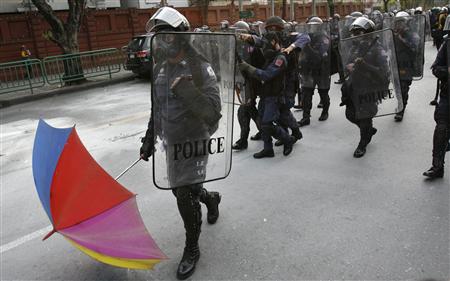https://twitter.com/OnlineMagazin/status/885443012976934913
* * *
PayPal: Donate in USD
PayPal: Donate in EUR
PayPal: Donate in GBP
The man who trades freedom for security does not deserve nor will he ever receive either. – Benjamin Franklin
https://twitter.com/OnlineMagazin/status/885443012976934913
* * *
PayPal: Donate in USD
PayPal: Donate in EUR
PayPal: Donate in GBP
H/t reader kevin a.
“Sweden’s tourism industry campsites and other accommodations that are important to the industry will be fully occupied by asylum seekers, with the high season approaching.”
From March 29, 2016:
– No Room at the Inn: Mass Migration Threatens Sweden’s Tourism Sector:
Sweden’s tourism industry has been threatened by the massive upswing in immigration, argues the Swedish newspaper Svenska Dagbladet, which explains that many hotels, campsites and other accommodations that are important to the industry will be fully occupied by asylum seekers, with the high season approaching.
The Swedish tourism sector has a yearly turnover of nearly 270 billion SEK (roughly 32 billion USD) and employs nearly 160,000 people, according to data from the Swedish Growth Board (Tillväxtverket). In addition to spending money on transport and accommodation, tourists visit restaurants, shops and entertain themselves, spending an additional 100 billion SEK (roughly 12 billion USD), according to a report presented last summer. Above all, the inflow of foreign tourists has increased sharply in recent years. Between 2000 and 2014, the foreign visitors’ total spending rose by a staggering 137 percent, making tourism an important source of revenue for Swedish companies, municipalities and the state.
Read moreNo Room at the Inn: Mass Migration Threatens Sweden’s Tourism Sector
Aug 26, 2014
More than 10 million people visit Bali each year, almost three times its local population. It is a huge stress on its resources, but with tourism so important to its economy, how can the competing demands be met?
Many thousands of cubic metres of waste are dumped everyday in Bali. A new local site not to be found on the tourist trail is Mount Rubbish. Worse still, the toxic run-off from this mountain of waste filters into Bali’s source of drinking water. “We are being poisoned by this pile of rubbish”, says environmental activist Moko. But garbage is not the only problem; Bali’s development is based on foreign exploitation, which has made locals feel that their very way of life is under threat. Many Balinese now believe that keeping culture and traditions strong could be their last defence. “We Balinese should take the move to save Bali, before it’s too late”, a local campaigner explains.

With a line-up that includes Drew Barrymore, David Beckham, Orlando Bloom, and Ricky Martin, the UN’s choice of ambassadors has been known to cause raised eyebrows or the odd smirk.
Seldom, however, has there been such anger, or questioning of the organisation’s credibility, as that greeting the appointment of a new international envoy for tourism: Robert Mugabe.
Improbable as it seems, the Zimbabwean president, who is widely accused of ethnic cleansing, rigging elections, terrorising opposition, controlling media and presiding over a collapsed economy, has been endorsed as a champion of efforts to boost global holidaymaking.
Despite that fact Mugabe, 88, is under a travel ban, he has been honoured as a “leader for tourism” by the UN’s World Tourism Organisation, along with his political ally, Zambian president Michael Sata, 75. The pair signed an agreement with UNWTO secretary general Taleb Rifai at their shared border at Victoria Falls on Tuesday.
Read moreZimbabwe President Robert Mugabe Asked To Be UN’s New International Envoy For Tourism
– Germans Just Say No To Greek Tourism, As Holiday Bookings Plunge By 30% (ZeroHedge, May 21, 2012):
The last time we looked at the Greek tourism industry or what’s left of it, ironically so very reliant on German tourists, we observed that receipts from this very critical to Greek tax receipts industry would likely drop to under €10 billion – a big hit to government revenues just when they are most needed. Needless to say, ongoing political chaos, a rise in anti-German sentiment, and a resurgent neo-nazi political power are not helping things. Sure enough Ekathimerini reports that German bookings continue to be in free fall: “German bookings for holidays in Greece have slumped by almost a third so far this year, a German Sunday paper quoted a Thomas Cook executive as saying. “By the beginning of the Summer season, booking numbers for holiday in Greece in the German travel industry have been 30 percent below the year-earlier figures,” Euro am Sonntag cited the head of tourism at Thomas Cook’s German unit, Michael Tenzer as saying in an excerpt of an article made available to Reuters on Saturday.”
Read moreGermans Just Say No To Greek Tourism, As Holiday Bookings Plunge By 30 Percent
WTF!
– Now Is the Season for Japan (New York Times, March 22, 2012):
ONE bright early spring morning this month, I took myself to Ryoanji, the Kyoto temple that is home to the world’s most celebrated rock garden. There was not a single other foreigner in the place. Not even many Japanese were visible across the 120-acre compound (I’d scheduled my trip for spring break, when clamorous school tours are less in evidence).
So as I sat above the enigmatic presentation of 15 rocks, arranged with seeming randomness across a wide bed of raked sand, I could hear nothing but bird song from the cherry trees around me. A trickle of water from a thin bamboo chute issued into a stone basin around the corner, deepening as it intensified the silence. The characters around the basin said, “What you have is all you need.”
Stillness, spaciousness and undistractedness are what I had just then. Though foreign tourism to Japan as a whole plunged by 50 percent in the three months following the earthquake last March, as of January 2012 it was only 4 percent lower, according to the Japan National Tourism Organization.
Nevertheless, the quiet amplitude that is one of the special graces of Japan has a new resonance this year. On the surface, the country that greets someone arriving from San Francisco or New York tomorrow is startlingly similar to the place you would have seen two years ago, despite last year’s catastrophe. But deep down, Japan seems more vulnerable, and thus more wide open, than ever.
The 9.0 earthquake, tsunami and nuclear meltdown that hit the country on March 11, 2011, claimed almost 20,000 lives, overturned an economy that had already been foundering through 20 years of recession, and demoralized a citizenry dealing with one suicide every 17 minutes, a loss of direction, and what is now seven prime ministers in fewer than six years.
Yet it also highlighted the resilience, self-possession and community-mindedness that are so striking in Japan; suddenly, the country that had seemed to insist on its difference from the rest of the world could be seen in its more human, compassionate and brave dimensions. Japan has long been what the globally savvy magazine Monocle called, in a recent issue, “The World’s Most Charming Nation”; now it is also one of those most grateful for visitors.
See also:
– Foreign tourist decreased by 2,400,000 in 2011 (Fukushima Diary, Jan. 20, 2012):
Foreign tourist to Japan decreased by 2,400,000 (-27.8%) in 2011.
2010 : 8,610,000
2011 : 6,219,300Read more2,400,000 Less Tourists Visited Japan in 2011 Compared To 2010
From the article:
Or as Professor Hayakawa of Gunma University often comments, “If you don’t educate yourself now and fast, you’ll die.”
– Tokyo Metropolitan Government to Subsidize Tours to Fukushima Only Next Year (EX-SKF,Jan. 10, 2012):
Did you even know that the Tokyo Metropolitan government had such a program?
Not satisfied enough by accepting and burning disaster debris of varying radiation levels from Iwate and Miyagi Prefecture (in case of the Miyagi debris, it is to be burned all over Tokyo) and collecting fat fees for “facilitating” the effort, the Tokyo Metropolitan government will now focus on the tourism industry in Fukushima Prefecture. It will subsidize tourists who will visit Fukushima, starting the next fiscal year which will start on April Fool’s Day.
From Yomiuri Shinbun (1/11/2011):
????????????????????????????????????????????????????????????????
The Tokyo Metropolitan government has decided to subsidize tourists who will visit Fukushima Prefecture starting the next fiscal year [that will start on April 1]. Tourists who visit on a day trip will be given 1,500 yen [about US$20], and tourists who stay overnight will be given 3,000 yen [about US$40] per night up to two nights.
Everyone that has studied the links provided below would have fled Fukushima, even Tokyo.
– #Fukushima I Nuke Plant “Cold Shutdown” Effect: “Let’s All Visit Fukushima” Campaign by the National Government (EX-SKF, Dec. 19, 2011):
It looks as if a total, complete cold shutdown has been achieved in the heads of some ministers and agency heads and career bureaucrats in the Japanese national government.
The Japan Tourism Agency under the Ministry of Land, Infrastructure, Transport and Tourism launched a new campaign on the day of the declaration of the “cold shutdown/accident over” by Prime Minister Yoshikiko “Saved by Kim” Noda.
What’s the campaign, you ask?
“Let’s go visit Fukushima Prefecture, now that the Step 2 of the TEPCO/government Roadmap has been completed!” Rejoice, it’s safe!
From the Japan Tourism Agency press release (12/16/2011):
– “Decontamination” for Next Year’s Cherry Blossom Viewing Season in Fukushima City (EX-SKF, Dec. 9, 2011):
Watari District, where rice with radioactive cesium exceeding the national provisional standard has been discovered, where Professor Yamauchi of Kobe University has said again and again that “decontamination” didn’t work and that it even increased the contamination.
I hear it is a very popular place for springtime cherry blossom viewing and partying, with hundreds of thousands of tourists each year visiting the place. Faced with another dismal season, the owner of the land where the trail to the mountain starts decided to “decon”.
From Yomiuri Shinbun (12/10/2011):
??????????????????????????????????????
On December 10, a decontamination experiment was conducted at “Hanami-yama” [cherry blossom viewing mountain] in Watari District of Fukushima City, in preparation for the next year’s viewing season.
??????????????????????????????????????????????????????????????????????????????????????????????????????????????????????
The place is famous for cherry blossoms, with about 300,000 tourists visiting each year. However, this year, the number of tourists dropped dramatically to only 94,000 because of the March 11 earthquake/tsunami and the Fukushima I Nuclear Power Plant accident. It is located in the mountains and the radiation levels are relatively high. So the owner of the land where the trailhead to the mountain is located asked a firm in Sasebo City in Nagasaki Prefecture to decontaminate. The firm is noted for its asbestos countermeasures.
Read more‘Decontamination’ For 2012 Fukushima Cherry Blossom Festival
What can you say?
– #Radiation in Japan: First International Flight to Fukushima Airport Since March 11 (EX-SKF, Nov. 19, 2011):
A chartered flight from Taiwan arrived for the first time since March 11 at Fukushima Airport, carrying tourists who will spend their vacations in locations inside Fukushima Prefecture.
I don’t understand why they do it; my best guess is that they just couldn’t pass up great bargains to be had in Fukushima. It could be the bargain that they didn’t even need to pay for the trip.
Asahi Shinbun (11/19/2011) reports:
? ??????????????????????????????????????????????????????????????????????? ???????????????????????????????????????????????????????????????????????? ????
The first chartered flight since the March 11 earthquake and Fukushima I Nuclear Power Plant accident arrived in Fukushima Airport. Regular international flights to and from Fukushima Airport haven’t resumed, due to the restrictions placed by foreign countries for the fear of radiation contamination. Fukushima Prefecture has been requesting the resumption of the international flights to the international airlines in foreign countries and regions, and November 19’s flight is the first result of the effort. However, according to the tourism section of the Fukushima prefectural government, the next flight is not scheduled.
Read moreFirst International Tourist Flight Since March 11 Lands At Fukushima Airport
– In booze-soaked Spain, the party may soon be over (Independent, August 28, 2011):
‘Binge tourism’ reaches a new low when police fire rubber bullets to restore peace. Alasdair Fotheringham reports from the Benidorm plaza dubbed ‘British square’
For decades now, the Spanish have taken an easy line on foreign tourists and the oceans of alcohol they consume in coastal resorts every summer. Not any more. The party is definitely over in one of the most emblematic of Spain’s mass tourism towns, Lloret de Mar on the Costa Brava, where, earlier this month, police fired rubber bullets at gangs of drunken revellers when they ran amok through the city, kicking in shop windows and setting a police car on fire. After two nights of clashes that dragged on until 7am, there were 20 injured, nine of them police officers, and 20 arrests. Tellingly – in a city of 40,000 with 25 discos, 261 bars and roughly a million tourists a year – all those in custody were foreigners, most of them reportedly French.
As far back as 2004 – when, after similar incidents, the then Catalan Minister of the Interior invented the phrase “binge tourism” – there were promises of clean-ups. This time, though, in a year which had already seen 15-year-old British expat Andrew Milroy stabbed to death outside a nightclub, (over which two French men have been arrested), the authorities say they mean business. “We’ve touched bottom on these questions,” the mayor of Lloret de Mar, Roma Codina said. “We will be shutting down the most conflictive bars and banning prostitution in public.” For good measure, he added, disco closing times were to be tightened up and there would be a crackdown on underage drinking. The police presence was massively stepped up, too.
See also:
– Greece Considers Exit from Euro Zone: Athens Mulls Plans for New Currency (Spiegel)
Tourism will not be the answer during the ‘Greatest Depression’.

Tourists relax on Mykonos. Photograph: Rene Mattes/ Rene Mattes/Hemis/Corbis
You come to Delos by way of its ancient harbour. This, one suspects, is just as Apollo would have wished. For it is here, under the shade of a palm, that they say the god of light was born. Far removed from the merry-go-round that is Athens – or the fears over Greece’s economic plight that have reached fever pitch – the uninhabited isle is afforded a reverence that few others know.
But for those braving the wind-swept seas on a Delos-bound ferry from Mykonos last week, there was no escaping the realisation that that crisis has also reached these hallowed parts. With litter bobbing on a film of filth off its beaches, its museum shop flooded and closed, and treasures – including the island’s famous lions – consigned to a building blighted by cracks, cobwebs and rusty scaffolding, the signs were hard to ignore. Lack of staff meant most of the gems had been roped off.

A protesting lorry driver argues with a police officer outside the Ministry of Transport in Athens. (AP)
Greek security forces have warned of a wave of violence reminiscent of the terror that stalked Italy in the seventies after urban guerillas threatened last week to turn the country into a “war zone”.
“Greece has entered a new phase of political violence by anarchist-oriented organisations that are more murderous, dangerous, capable and nihilistic than ever before,” said Athanasios Drougos, a defence and counter-terrorism analyst in Athens.
“For the first time we are seeing a nexus of terrorist and criminal activity,” he said. “These groups don’t care about collateral damage, innocent bystanders being killed in the process. They are very extreme.”
The threats came from a guerrilla group called the Sect of Revolutionaries, as it claimed credit for the murder of Sokratis Giolas, an investigative journalist. Giolas was shot dead outside his Athenian home on 19 July, in front of his pregant wife.
The gang promised to step up attacks on police, businessmen, prison guards and “corrupt” media – and, for the first time, threatened holidaymakers.
“Tourists should learn that Greece is no longer a safe haven of capitalism,” its declaration said.
“We intend to turn it into a war zone of revolutionary activity with arson, sabotage, violent demonstrations, bombings and assassinations, and not a country that is a destination for holidays and pleasure.”
In an accompanying picture, the group displayed an arsenal that included AK 47 assault rifles, semi-automatic pistols and brass knuckledusters.
“Our guns are full and they are ready to speak,” it said. “We are at war with your democracy.”
Read moreSect of Revolutionaries Warns Greece Will Be A War Zone

Bushmen from the Khomani San community strike poses in the Southern Kalahari desert, South Africa Photo: GETTY
Ever since 1996, I have been following one of the most poignant tragedies of the modern world – the ruthless drive by the Botswanan government to expel the last remaining Bushmen, the original inhabitants of Africa, from their ancestral homeland in the Central Kalahari Game Reserve.
Although, in 2006, the country’s high court upheld the Bushmen’s right to remain in the reserve under Botswana’s constitution, the authorities have continued to persecute them, not least by denying them access to the borehole that provided them with water,
Now, in a further cynical twist to this inhuman policy, the authorities have permitted a supposedly eco-conscious company to open a tourist lodge in the reserve, complete with a swimming pool full of what the firm describes as “the most precious commodity in the desert”. Guests can even enjoy a “Bushman Walk”.
Not the least shocking feature of this official campaign of racial persecution is that it has been supported by our own Government (which first set up the reserve as a haven for the Bushmen in 1961), and also by the EU, which has poured aid worth millions of euros into Botswana’s tourist economy.
The UN’s rapporteur for indigenous peoples recently condemned the cutting off of the Bushmen’s water supply, and in June their plea for their water supply to be restored (which is supported by the admirable charity Survival International) will be heard in the courts. Meanwhile, weary Kalahari ecotourists can continue to cool off in the very water the Bushmen are denied.

Retail and tourism giant Arcandor has filed for bankruptcy
BERLIN (AFP) — Retail and tourism giant Arcandor said on Tuesday it had filed for bankruptcy with the likely loss of around 43,000 jobs in Germany, after Berlin dismissed its request for emergency state aid.
“Arcandor AG today filed with the Essen District Court to open insolvency proceedings due to threatening illiquidity,” the statement said.
Related article: Arcandor Files for Insolvency on State Aid Rejection (Bloomberg)
Travel agency Thomas Cook, in which Arcandor holds a 52-percent stake, “will remain unaffected by the insolvency proceedings,” the statement added.
The group, which employs 70,000 people in Europe, two-thirds of whom work in Germany, said its department store chain Karstadt, as well as mail-order company Quelle, would also be affected by the insolvency.
On Monday, Berlin rejected the company’s request for 650 million euros (902 million dollars) in state loan guarantees and 437 million euros in emergency loans but gave the firm one last chance to submit an improved bid.
Read moreGerman retail giant Arcandor goes bust: 43,000 jobs at risk
A MACABRE traffic associated with poor countries in Asia and Latin America has sprung up for the first time in western Europe as the credit crunch reduces Spaniards to selling organs to “transplant tourists”.
Spanish “kidney for sale” advertisements have proliferated recently on the internet as people struggle to make ends meet in a country whose 17% unemployment rate is the highest in Europe.
Sergio, a 42-year-old welder and father of four, said he had received an offer of £20,000 from a German couple who needed his kidney for their five-year-old son. If tests showed them to be compatible, an operation would be performed in a “third country” since such transactions are illegal in Europe.
“Apparently, there’s a waiting list of at least five years for a kidney in Germany,” he told a television programme, “but in five years the kid will be dead.”
Just to advertise a human organ for sale is illegal in Spain and other sellers sounded nervous when contacted last week on the telephone by The Sunday Times.

From the Palm Islands to Emirates Bank, grand Dubai, United Arab Emirates, feels the economic crunch
They were heralded as “The 8th Wonder of the World” by numerous travel sites. They required a staggering $60 billion to construct, according to their developers. They attracted A-List celebrities from the Jolie-Pitts to the Beckhams to Lindsay Lohan. They were, in fact, “one of the most enterprising and ambitious ventures to ever have been imagined,” according to travel Web site Destination 360.
“They” are the epic Palm Islands, a series of three man-made islands in the shape of a palm tree, that along with the surrounding city of Dubai, were considered the “it” playground to the stars, a chic status-symbol to the rich, and a mammoth, epic, super-expensive, luxury landmark to the rest of us.
When you”re this high, you”ve got a long way to fall… And fall they have.
Yes, the global recession seems to be official, as the Palm Islands and Dubai have smacked into economic trouble, according to numerous published reports.
“It is clear that tens of thousands have left, real estate prices have crashed and scores of Dubai”s major construction projects have been suspended or cancelled,” the New York Times reports.
And the Palm Islands themselves? Not looking so good. The Mirror reports that the islands” real estate values have plummeted – by about half. Properties that were selling for about $4.5 million are now going for around $2.3 million. Probably not welcome news to celebs like Brad Pitt and Angelina Jolie who own property there, the paper reports.
But it gets worse. Real estate developer, Nakheel, maker of Dubai”s Palm Islands, has suffered recent layoffs, according to ABC News. The Guardian reports that the third of the Palm Islands, the Palm Deira, which was previously under construction, is on hold, and VIrtualTripping.com reports that it is downsizing in scale.
 Entry into the Land of the Free is still free Entry into the Land of the Free is still free |
The Foreign Office is warning that thousands of tourists could be turned away at US airports and ports, as a new online entry system comes into effect.
From 12 January, visitors from countries which do not need visas will need to fill in an electronic form at least 72 hours before they travel.
Those who have not registered risk being detained and sent back home.
The Foreign Office fears some people do not know about it and critics say it might put people off visiting the US.
The new online registration scheme replaces the green I-94 forms that people on short term visits to the US had to fill in on the flight and hand to customs on arrival.
Security approval
America welcomes nearly 60 million tourists a year and about 50 million of those travel without the formality of a visa.
Britain is one of the countries that signed up to the visa waiver programme, but from Monday, new rules apply.
Electronic applications – known as Esta (Electronic System for Travel Authorisation) – have to be approved by the US Department of Homeland Security.
Nov. 26 (Bloomberg) — Thai authorities warned of flight chaos for thousands of passengers and damage to the tourism industry after anti-government protesters stormed the main terminal at Bangkok’s international airport, closing it down.
Four people were injured by a grenade this morning at the airport, TPBS television station reported. Parnthep Pongpourpan, a spokesman for the protesters, said the injuries weren’t serious and the People’s Alliance for Democracy group will wait for the return of Prime Minister Somchai Wongsawat, whose resignation they are demanding.
The demonstrators, who want Somchai to take responsibility for deadly clashes with police last month, may force him to declare a state of emergency to prevent escalating violence. The prime minister, set to return today from the Asia-Pacific Economic Cooperation forum in Peru, has rejected the resignation calls and police have avoided using force since the Oct. 7 clash in which two people died and 470 were injured.
“Tens of thousands of tourists will be stranded here as we stopped departure flights,” Porntip Hirunkate, secretary-general of the Tourism Council of Thailand, told Thai PBS television late yesterday. “This will hurt our tourism in December, which is our high season. The impact may go further to next year too.”
Read moreThailand Cancels Flights as Protesters Storm Airport

Riot policemen march towards anti-government demonstrators protesting outside Parliament in Bangkok October 7, 2008. REUTERS/Sukree Sukplang
BANGKOK (Reuters) – Thailand’s military put troops on the streets of Bangkok on Tuesday to keep order after a day of battles between police and anti-government protesters in which more than 380 people were injured.
One man was killed by a car bomb near parliament, police said, where protesters involved in a four-month campaign to unseat the government battled riot police in clouds of teargas.
Army commander Anupong Paochinda said police asked for help and he denied rumors of a coup, two years after the military ousted Prime Minister Thaksin Shinawatra in a bloodless putsch.
“People should not panic. Soldiers will not launch a coup since it will not be good for the country,” he told reporters.
From January 2009, short-term visitors will only be granted entry to the US once they have registered on the website of the Electronic System Travel Authorization. This replaces the current procedure of filling out a green form handed out during the flight.
The move is meant to place greater emphasis on defending the country’s borders against the threat of terrorism. The new system is also seen as a response to the perceived growth of religious extremism in European countries, whose citizens are able to enter the US more easily.
It is hoped the new requirements will highlight people with questionable backgrounds before they leave their home country. Currently, they are able to fly to America, only to be sent back straight away by customs officials if deemed not suitable for entry.
The revamped system will affect the 27 nations covered by the visa waiver program, which includes Great Britain, and gives citizens the right to remain in the US for short periods of time without a visa. All the information filled in on the website will be held by US authorities for 15 years.
Those who fly regularly across the Atlantic stand to benefit as an approved application remains valid for up to two years, or until the traveller’s passport has run out. It also entitles the holder to multiple entries to the US during this period.
Read moreUS: New regulation for tourists requires online registration
PORT-AU-PRINCE, Haiti – A desperate appeal from the president Wednesday failed to restore order to Haiti’s shattered capital, and bands of looters sacked stores, warehouses and government offices.
Gunfire rang out from the wealthy suburbs in the hills to the starving slums below as 9,000 U.N. peacekeepers were unable to halt a frenzy of looting and violence that has grown out of protests over rising food prices.

Many of the protesters are demanding the resignation of the U.S.-backed president, Rene Preval, and on Tuesday U.N. peacekeepers had to fire rubber bullets and tear gas to drive away a mob that tried to storm his palace.
He delivered his first public comments Wednesday, nearly a week into the protests. With his job on the line, Preval urged Congress to cut taxes on imported food and appealed to the rioters to go home.
“The solution is not to go around destroying stores,” he said. “I’m giving you orders to stop.”
But gunfire rang out around the palace after the speech, as peacekeepers tried to drive away people looting surrounding stores.
The streets remained in the control of bands of young men carrying sticks and rocks, who set up roadblocks of burning tires and stopped passing cars. Businesses were closed and most people locked themselves indoors, as mobs looted stores, warehouses and government offices.